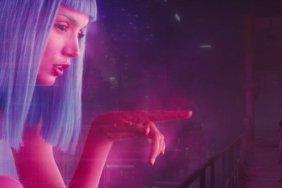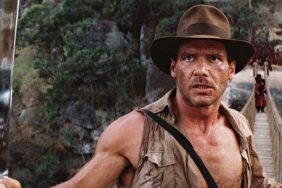You don’t want to read this until you’ve already seen Blade Runner 2049, and trust me, you definitely want to see Blade Runner 2049.
Opinions may differ on what counts as a “spoiler”. To some, the whole plot of Blade Runner 2049 – from the first screen onward – felt like one massive spoiler. For others, calling information that’s revealed in the first few minutes of a movie a “spoiler” feels like total overkill.
But one thing we can all agree on: the very last thing that happens in a movie like Blade Runner 2049 is definitely a spoiler. So be warned, and don’t ruin this for anybody else. We’re about to talk about the final, emotional moments of Blade Runner 2049 with director Denis Villeneuve, and we’re going to talk about them in detail.
MASSIVE SPOILER WARNING:
You ready?
Blade Runner 2049 concludes with K (Ryan Gosling) and Deckard (Harrison Ford), one of them dying, the other meeting their daughter for the very first time. It also concludes with subplots about a possible Replicant uprising completely unresolved. Like the original Blade Runner before it, it’s an ending that straddles the line between cynicism and hope, and one that leaves many unanswered questions.
So I asked Denis Villeneuve those questions. Here’s what he had to say. (Click here for the first, non-spoiler half of my interview with Denis Villeneuve.)

Warner Bros.
Also: ‘Blade Runner 2049’ Review | Things You People Wouldn’t Believe
Crave: There are two things that I thought were really interesting about [the ending]. One is that we’re building. It’s talking about ideas of uprising and war with the replicants, and you don’t end there. You chose to end with K and Deckard.
Denis Villeneuve: Yes.
Is all of that just backdrop for their intimate story? Or are you maybe building something, and is there another Blade Runner you want to make?
I think that the truth is the following: me, I got on board with this project because I thought there was a strong story there, and I had never a word from the producers or the studio to think about what’s coming next.
So my job as a director, I mean, I made this movie as a standalone. But I know that Hampton [Fancher] and Michael Green have some plans in mind where it could go, and I think that… I like the way this movie was produced, really, like putting all the eggs in the same basket and not thinking about what’s coming after. There’s something very radical about this approach.
No, they didn’t [write] six screenplays. But yes, there’s some clues of what could come after. That tension between the synthetic humans and humans could ratchet up to something that becomes more than just an intimate story. But me, what I loved about that, what I did, is again, it’s following one character and we are going to a story that is told from an intimate point of view. The rest is for the future and I can’t comment on it because I have no idea, and I didn’t want to know. For me it’s like… I just wanted to focus on this one.
So this is your Blade Runner sequel, and from here you will move on? You don’t know if you’d want to continue?
I don’t know. It was a journey to make this one and I need to digest. I finished the movie a few weeks ago. I was still doing the subtitles for the French version ten days ago, you know? What I’m saying is I have no distance. I just need to go back home and sleep! And see, sometimes I’m still waking up in the morning, saying to myself “What have I done? What have we done?” It’s madness. So let’s look at how this one […] how it is received, and yeah. That’s what I would say.

Your movie has two endings. We end with K, dying, having done his job. And we end with Deckard, meeting his daughter. It occurs to me that you made a very distinct choice to put K dying before Deckard meeting his daughter.
Yeah.
It’s a much more hopeful ending, I think, than at least the director’s cut of Blade Runner.
Yeah, it’s true.
But you could have switched those [moments]. Tell me about that decision.
The thing is, in the screenplay it was like there was a movement of back and forth, between both [moments], and it was important for me to stay close to the character, to end his story, and to see the legacy of what he had done. You know? [His] broken dreams… something that defines humans for me are broken dreams, the fact that we can have that kind of melancholic relationship with something that we wish we had been or we had done and didn’t happen. That beautiful melancholy that happens there, that’s K’s legacy. I like the idea that the end of the story, ends with K’s death and then there’s a little epilogue after to see the result of his sacrifice. I thought that was a more powerful way to end the movie.
It’s a very sentimental ending for you, I find.
[Thinks.] I don’t like sentimentalism. [Laughs.]
That’s why I bring it up! Your films aren’t typically very sentimental but this was a very hopeful, nice, positive ending.
But I thought what Harrison brought as an emotional at the end is very subtle, and I think, after all that journey in the dark, and […] it’s not bad to have a little bit of hope, at the end, myself. I just don’t want to be cynical. I don’t want to. I’m a worried optimist. I want to, I think at the end of the movie, I needed… Like, I did Arrival the same way. I need a little bit of spark of light at the end, yeah.
Top Photos: Warner Bros.
William Bibbiani (everyone calls him ‘Bibbs’) is Crave’s film content editor and critic. You can hear him every week on Canceled Too Soon and watch him on the weekly YouTube series What the Flick. Follow his rantings on Twitter at @WilliamBibbiani.








